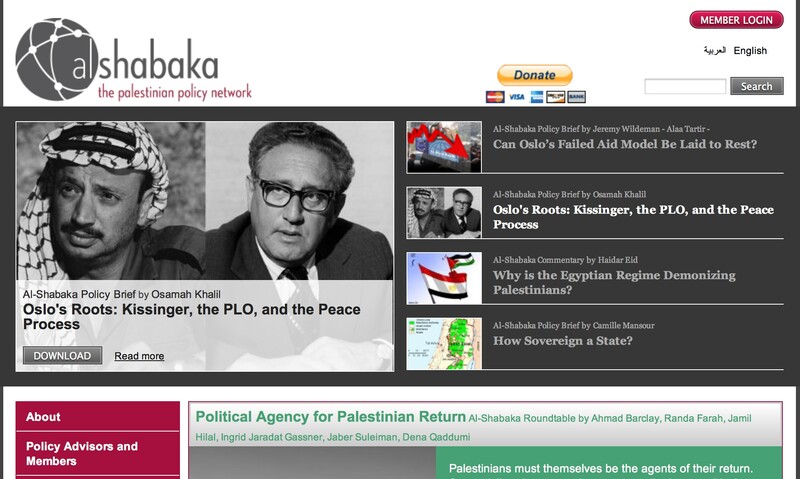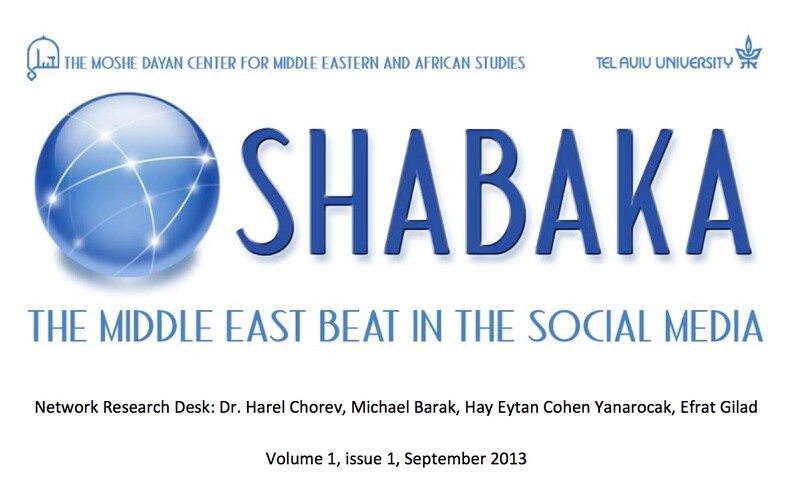22 September 2013

Screenshot from the website of Al-Shabaka: The Palestinian Policy Network shows the logo it has been using for years.
Having seen so much of their country occupied and colonized by Israel, Palestinians have often objected to Israeli attempts to appropriate symbols of their culture as well, including dishes like hummus, falafel and olive oil, as well as dance, music and folklore.
But here’s a new twist. The Moshe Dayan Center for Middle Eastern and African Studies at Tel Aviv University has ripped off the name and logo of the well-known Palestinian think-tank Al-Shabaka: The Palestinian Policy Network (for which I am a policy advisor).
The name Al-Shabaka means “the network” in Arabic, reflecting the fact that Al-Shabaka’s Palestinian members and contributors are dispersed all over the world.
“Al” preceding the name is the Arabic definite article, roughly equivalent to “The” in English.
At the top of this post is a screenshot from Al-Shabaka’s website including the logo it has been using for years.
Uncanny similarity
This month, the Moshe Dayan Center at Tel Aviv University launched a new publication with the name “Shabaka.” This is its logo:

The logo for “Shabaka” released this month by the Moshe Dayan Center at Tel Aviv University bears striking resemblance to that of Al-Shabaka.
The first issue states:
Shabaka (“Network” in Arabic and Turkish) is a new newsletter published by the Moshe Dayan Center. It will summarize and analyze noteworthy trends of discussion on Arabic and Turkish SNS [social networking sites].
“Blatant lifting”
I asked Nadia Hijab, co-founder and director of Al-Shabaka, what she thought of the striking similarity. She wrote:
We were really shocked and upset to see this blatant lifting of not just our name but also our logo. It looks like the intention is to sow confusion and try to make life harder for a think-tank aiming to put a Palestinian policy voice on the map. But our numbers are growing – members, readers, social media outreach – and that’s certainly not going to stop us. We’ve written to them asking them to cease and desist.
Unlikely to be coincidence
Any Internet search for the word “shabaka” produces a link to Al-Shabaka high in the results. It is not credible that the Moshe Dayan Center would have been unaware of Al-Shabaka when it chose the name “Shabaka.”
It is even more implausible that the Moshe Dayan Center independently came up with an almost identical logo.
Tel Aviv University is itself built on stolen Palestinian land belonging to the village of Sheikh Muwannis.
When Israel has already taken so much from Palestinians, perhaps, someone thought, “so what if we help ourselves to a name and logo as well?”
Update
Shortly after publishing this post, I was informed by Nadia Hijab that Al-Shabaka had received an emailed response from Moshe Dayan Center director Uzi Rabi saying that Tel Aviv University is closed this week, but that they will treat this as an urgent matter and provide a full response.
In reaction, Hijab commented: “It’s good they’re taking this seriously. The similarity between the names and logos is so striking that we feel driven to treat this as an act of infringement on our intellectual property. We trust that they will respond appropriately and that it will not be necessary to pursue this matter further.”
Update, 23 September: Dayan Center withdraws “Shabaka” name, logo
Nadia Hijab, co-founder and director of Al-Shabaka, has informed The Electronic Intifada that she received a further response this morning from Uzi Rabi, director of the Moshe Dayan Center at Tel Aviv University.
According to Hijab, Rabi said the issue around the name of his center’s “Shabaka” publication was brought to his attention by Hijab’s letter and that, in order to avoid future misunderstandings, he has instructed staff to change the name and logo of the publication, effective immediately.
Hijab added: “This is a very satisfactory outcome and I appreciate the swift action taken to directly address this issue. Al-Shabaka can now redouble its efforts to put a Palestinian policy voice on the map, pulling together Palestinian and other expertise to develop strategies and policies for a truly just solution – one that guarantees freedom, justice, and equality.”





Comments
AlShabaka
Permalink Jo Zak replied on
It looks like the Israeli's are jealous and want to be more Palestinians lol
network/globe image
Permalink Rex Brynen replied on
I suspect that both images originally derive from the image that Apple has used for many years to depict a network. This is sufficiently widely copied that you'll even find how-to instructions on the web (http://flyosity.com/tutorial/h...).
The Al-Shabaka logo was
Permalink Ali Abunimah replied on
The Al-Shabaka logo was specifically designed for the organization and is not a “stock image.” As far as I have been able to determine, there are no other organizations called “Al-Shabaka” or “Shabaka” using the globe with network points motif, except of course for the two mentioned in this story.
Make a mountain out of a molehill
Permalink Darth replied on
both logos could have originated from similar stock images.. Just search for "network stock image" to find other similar images.. Some are even within the CC domain
The Al-Shabaka logo was
Permalink Ali Abunimah replied on
The Al-Shabaka logo was especially designed for the organization, and has been in use for several years now.
Obviously both icons were
Permalink Philip replied on
Obviously both icons were taken from one of the many (free) icon stocks. Just google "Internet Network Icons" or "Network Icons" and find dozens versions of the networked globe. That's a generic logo.
As for the title, shabaka is a network. can you imagine forbidding someone to use this common term in English? Hundreds, if not thousands, companies carry this name.
As I’ve stated, this is
Permalink Ali Abunimah replied on
As I’ve stated, this is factually incorrect. The Al-Shabaka logo was specifically designed for Al-Shabaka and was not taken from anywhere else.
Can You Imagine? -- Yes I Can
Permalink iResistDe4iAm replied on
Philip says: "As for the title, shabaka is a network. can you imagine forbidding someone to use this common term in English?"
It's OK to use any word or combination of words so long as they don't infringe the name of existing companies/entities. As clearly pointed out, the Moshe Dayan Center's use of name and logo BOTH infringe on Al-Shabaka's intellectual property (which is why the Center has now agreed to change both).
In English, the word NEWS is even more common than NETWORK. Can you imagine News Corporation allowing another company (non-related) to use "News Company" or "News Co" or similar?
The central point here--
Permalink Helena Cobban replied on
Congratulations to Nadia Hijab and the rest of the Al-Shabaka team both for publishing important, timely pieces of policy analysis and for defeating this latest attempt at cultural appropriation with determination and dignity!
I also know that decisions made regarding logo design, naming, and other aspects of branding always involve a lot of work and are never just as "simple" as lifting some general ideas off an Apple website, as implied here. When I founded my company we considered incorporating a globe image-- of a very different form than Al-Shabaka's-- and discovered how many different ways a globe could be represented in two dimensions. It is very hard to believe the Dayan Center's project leaders had simply "chanced" upon a design (and a name) very similar to those of the already well established Al-Shabaka... So it is good that the Center Director, upon being informed of what had happened, pulled the plug on their confusing branding plans immediately.
Thanks for this thoughtful
Permalink Ali Abunimah replied on
Thanks for this thoughtful comment Helena. Although I wasn’t part of the process, I do know for a fact that Al-Shabaka did indeed go through a very extensive and thoughtful process of designing its logo, as part of a bigger effort to establish its presence, reputation and credibility. Moreover, given the similarities in the logos, there was of course a reputational risk that Al-Shabaka, which is totally independent, could have been confused for something affiliated with a Tel Aviv University center named after one of Zionism’s most notorious war leaders and supporters of ethnic cleansing of Palestinians! I wonder if those dismissing or belittling the effort that Al-Shabaka went through havehad the experience of setting up an organization themselves, with all that that entails.
Helena, such a disappointment
Permalink David Grossman replied on
Helena, such a disappointment to see senior scholars like yourself, who contributed a thing or two to ME studies, falling to the trap of exploiting such a minor, probably coincidental problem, for political use. I am certain that if, let's say an American Institute and not an Israeli was involved you would never use such language and serious accusations. Shame on you, treating colleagues this way just because of your hate to Israel.
you do not have a case
Permalink Jorgen Klaff replied on
I wonder if "al-shabaka - the palestinian policy network" and "Shabaka - the Middle East beat in the social media" can be considered legally the same name or "cultural appropriation". I seriously doubt it.
Stealing Thoughts
Permalink Dave Lucas replied on
"Blatant Lifting" accurately describes this "endeavour." But piracy of intellectual property and image design has grown like a gnarly weed across cyberspace. I believe that individuals / organizarions / media that pirate blog content are nothing more than "digital muggers." I have brushes with them all the time. Recently I posted an article concerning fake online reviews, only to witness chunks of my ideas and content “borrowed” without payback! How dreadful Some content used internationally online was partially extracted from/inspired by:
http://dave-lucas.blogspot.com...
My article appeared online September 23. Let’s stop digital piracy!